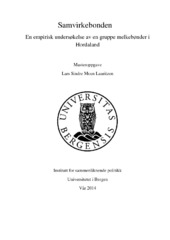| dc.contributor.author | Lauritzen, Lars Sindre Moen | eng |
| dc.date.accessioned | 2014-08-11T08:35:35Z | |
| dc.date.available | 2014-08-11T08:35:35Z | |
| dc.date.issued | 2014-06-02 | eng |
| dc.date.submitted | 2014-06-02 | eng |
| dc.identifier.uri | https://hdl.handle.net/1956/8247 | |
| dc.description.abstract | Abstract The topic of this master thesis is about the Hordaland farmer and his relationship to the cooperative. The research questions of this thesis are as follows: Which negative and positive sides does the cooperative have? Is the cooperative important for the farmer? The selection of informants contains four male present, former and future dairy farmers. All the informants in the selection live and work in Hordaland county. The data is gathered through qualitative interviews with each of the four farmers. The agricultural sector is an important sector in the western parts of Norway and in Hordaland. A lot of people living in this geographical area have some form of relation to agriculture and farming, and it is a topic of considerable public interest. Consequently writing a thesis on this topic has been very exciting. Results from a range of studies in the field of research on cooperatives are presented in this thesis, and they are used to illuminate the data collected and provide a framework. Two additional theories are presented, the theory of organizational commitment (Meyer & Allen, 1991:67) and the theory of ownership (Hansmann, 1996). The theory of organizational commitment is used to analyse the collected data and three types of commitment are presented: affective commitment (the want-approach), continuance commitment (the need-approach) and normative commitment (the should-approach). These approaches are useful for investigating why the farmer is a cooperative member and if the farmer experience the cooperative as useful to him. This theory is first and foremost intended to be used for studying employees in an organization, but I have found it useful in connection with cooperative members. The theory of ownership presented by Hansmann is useful to illuminate the historical importance of the cooperative in a historical context, and to compare the cooperative organization with other types of businesses. Chapter 7 - Conclusion, presents the answer to the research questions of this thesis. The main findings of this thesis is that the cooperative is important to the farmers of Hordaland that I have interviewed, it gives them economic security and stability and according to mye informants the cooperative is also important to secure small scale farming. The farmers view the member democracy as something important, but according to ther farmers I have interviewed it is under pressure and in danger of being diluted. | en_US |
| dc.description.abstract | Sammendrag Denne oppgaven handler om Hordalandsbonden og hans forhold til samvirke. Problemstillingene er: Hvilke negative og positive sider har samvirke i dag? Er samvirke viktig for bonden? Utvalget består av fire mannlige nåværende, tidligere og framtidige melkebønder. Alle informantene i utvalget bor og virker i Hordaland fylke. Datamaterialet som studien bygger på er kvalitative intervjuer med hver av de fire bøndene. Landbruksnæringen er en viktig næring på Vestlandet og i Hordaland. Mange av de som bor innenfor dette geografiske området har et eller annet forhold til landbruk og gårdsdrift, og det er stor interesse for temaet i det offentlige rom. Dette har gjort det spennende å skrive om dette temaet. I oppgaven presenteres det flere forskningsresultater på samvirkefeltet, disse benyttes for å belyse dataene som er samlet inn, og fungerer som et rammeverk. I tillegg presenteres det to teorier, Meyer & Allens teori om organisatorisk engasjement (Meyer & Allen 1991: 67), samt Hansmanns eierskapsteori (Hansmann: ). Teorien som omhandler organisatorisk engasjement, benyttes for å analysere dataene som er samlet inn gjennom intervjuene, og tre tilnærminger benyttes: vil-tilnærmingen, trenger-tilnærmingen og bør- tilnærmingen. Disse tilnærmingene er hensiktsmessige for å finne ut hvorfor bonden er medlem, og om bonden ser på samvirke som viktig for han. Denne teorien er først og fremst ment for ansatte i en organisasjon, men jeg har valgt å benytte den for medlemmer i et samvirke. Hansmanns eierskapsteori benyttes for å belyse samvirkets betydning i en historisk sammenheng, og for å kunne sammenligne samvirkeorganisering med annen type virksomhet. I oppgavens konklusjon presenteres svarene på oppgavens problemstilling. Hovedfunnet i oppgaven er at samvirke er viktig for Hordalandsbøndene jeg har intervjuet, det gir dem økonomisk trygghet og stabilitet og er i følge mine informanter også med på sikre småskalalandbruket, som er av stor betydning i Hordaland. Av negative sider, trekkes tendenser i utviklingen av medlemsdemokratiet fram som et punkt. Medlemsdemokratiet er viktig for bonden, og en grunn for å være medlem. Samtidig er medlemsdemokratiet under press, noe som trekkes fram av flere av mine informanter. | en_US |
| dc.format.extent | 779725 bytes | eng |
| dc.format.mimetype | application/pdf | eng |
| dc.language.iso | nob | eng |
| dc.publisher | The University of Bergen | eng |
| dc.subject | Samvirke | eng |
| dc.subject | hordaland | eng |
| dc.subject | bonde | eng |
| dc.subject | tine | eng |
| dc.title | Samvirkebonden - En empirisk undersøkelse av en gruppe melkebønder i Hordaland | eng |
| dc.type | Master thesis | en_US |
| dc.rights.holder | Copyright the author. All rights reserved | en_US |
| dc.description.degree | Master i Sammenliknende politikk | |
| dc.description.localcode | SAMPOL350 | |
| dc.description.localcode | MASV-SAPO | |
| dc.subject.nus | 731114 | eng |
| fs.subjectcode | SAMPOL350 | |
